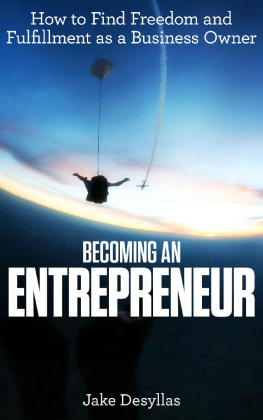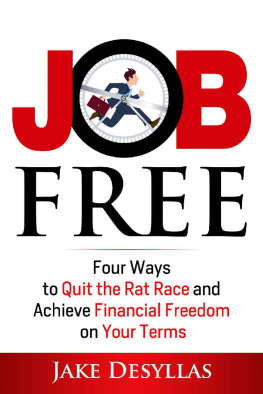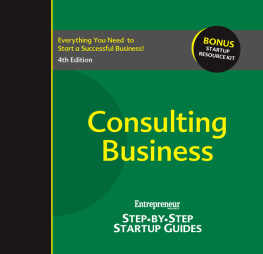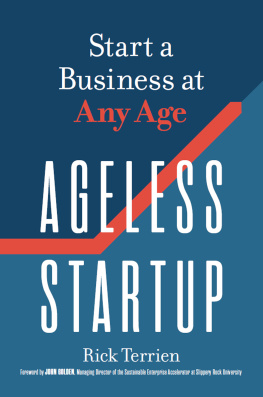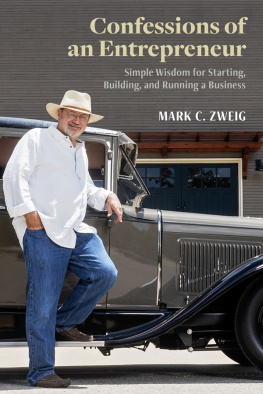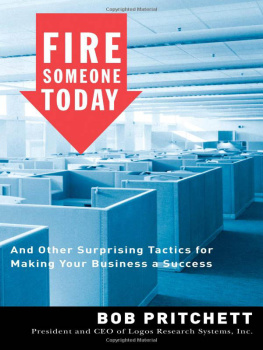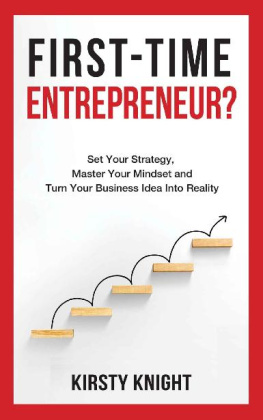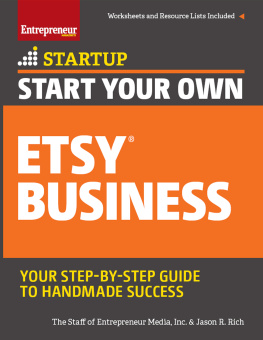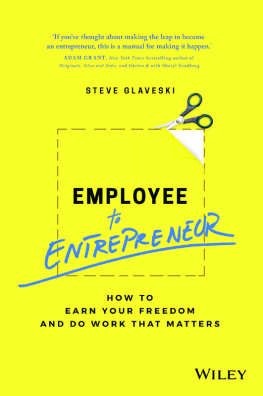Becoming an Entrepreneur
How to Find Freedom and Fulfillment as a Business Owner
by Jake Desyllas
Contents
Introduction
Becoming an entrepreneur fundamentally changed my view on how to achieve freedom and fulfillment. Starting a business is the most liberating act that you can undertake in your life. Its a peak experience that will change you forever, regardless of the outcome.
Entrepreneurship gave me the freedom to live every day as I choose. It enabled me to master challenges that once scared me. It gave me the opportunity to dedicate myself to work that is truly meaningful to me. For a long time, that work involved founding, growing, and finally selling my own business. Today, the work that is most meaningful to me is helping others to free themselves through entrepreneurship.
I dont come from an entrepreneurial family. For most of my childhood, I lived in a communal squat in South London. The adults that I learned from were employees, not business owners. I grew up in a political atmosphere at home and school in which people were suspicious of business; I was taught the word capitalistas a pejorativeat least a decade before I learned the word entrepreneur. I spent years in college and postgraduate research before it even occurred to me that I could start my own business.
Like most people, I learned nothing in school about entrepreneurship. I wasnt even aware that it was a viable option. I got the same message from school that I heard from my parents: the key to a good life is a good job, and the key to getting a good job is getting good grades.
Nonetheless, deep down I knew that I never wanted to work for anyone else. The prospect of spending life as an employee seemed like such a drag. I believed that it must be possible to do something more fulfilling with my life than working for other people, even though I didnt know what that would be.
As I experimented with different kinds of work and postgraduate study, I could see people of my own age founding businesses in the first wild wave of Internet startups during the boom years of the 1990s. I saw people of my generation grow and sell their businesses and retire early to do whatever they wanted with their days. That all looked like awesome fun. They didnt seem smarter than me, so I figured if they could do it, I could do it too.
I became an entrepreneur at the age of twenty-eight, when I created a startup called Intelligent Space with one business partner. We defined Intelligent Space as a pedestrian movement consultancy. Our goal was to help architects, engineers, and property developers make the world a better place for pedestrians. Pedestrian flows are the lifeblood to the economy of cities: they are vital to all face-to-face retail. The presence or absence of people on foot can make a city street either a place that you want to be in, or one that feels dangerous. At the time, there were very few tools available to assist architects and developers in creating pedestrian-friendly designs.
We developed computer simulations that mapped where people are likely to walk, which is often not the same as where architects or engineers think they should walk. We used science-based methods to turn pedestrian movement from an undervalued resource into a tangible and manageable asset. I was aware that the designs of many buildings and streets were terribly dysfunctional for pedestrians, and I saw an opportunity to help improve urban designs through the simulation of pedestrian flows.
After starting the business, I began to realize how little I understood about entrepreneurship and how many mistakes I was making. I had technical skill, but I did not understand how to provide a service that was helpful. I had a lot of drive, but I wasnt clear about the purpose of my business. I avoided selling to clients because it was uncomfortable, even though it was the most important thing to do. I didnt have systems in place to track and analyze how my business was performing, so I didnt know about many problems until it was too late. I worked ridiculously long hours. Day-to-day operations were still very dependent on me, so I did a lot of work that I could have delegated.
Because I didnt know what I was doing, the growth of my company was unsustainable. In the first year, we spent a lot of money on things that we didnt need, like the rental of a nice office. We had to cut back and fire people shortly after we completed our first big project because we didnt have any new projects lined up. I took on large debts to fund my business. I was personally on the hook for over 150,000 (approximately $246,000) in loans. It was the biggest risk I had ever taken and after two years, it did not look good.
My education had trained me for life as a reliable employee and taught me nothing of what I needed to know to run a business. I was just making it up as I went along, and that wasnt working. I needed conscious principles to follow in making decisions about my business. I resolved to learn everything that I could about entrepreneurship and to start running the business in a more principled way as fast as I could. I read voraciously, paid for business coaching, and did a lot of rethinking.
As I implemented what I was learning, the business went from one that lacked clear direction to a highly transparent and systematic operation. Intelligent Space became a very successful consultancy. It took five years to pay off the initial loans and achieve profitability. We continued to grow revenue and increase our profit margin, until we sold the business to a multinational engineering company in a trade-sale two years later.
In the end, my little startup had a clearer purpose, more transparent business controls, and a higher profit rate than the huge multinational company that bought us. I worked as a director in the multinational company for three years, as part of an earn-out agreement. Then I retired early, at the age of thirty-eight.
About This Book
This book is for you if you want to become an entrepreneur, or if you already are one and want more freedom and fulfillment. Ive set out the principles that helped me directly in becoming a successful entrepreneur. Although I use examples from my experience in starting a consultancy, the principles that I discuss in the book are true for any industry.
Ive tried to express these ideas as simply as possible, avoiding technical language wherever possible. You dont need much background knowledge of business in order to understand the contents. Ive drawn from a wide variety of sources, especially from other entrepreneurs. I f you are interested in reading more about the principles that I adopted, you can find references in the footnotes and suggestions for further reading at the end of the book.
In a nutshell, these were my guiding principles :
Be helpful. Make something people want. I hold a BA Honors (first class), an MSc (with distinction), and a PhD. It was humbling to realize that such things are largely irrelevant in business. What counts is ones ability to be helpful and make something that people want. This is what is about.
Provide purpose. I started the business with only a vague idea of what I was doing. I came to understand that my most important responsibility was to provide a defining purpose and a clear vision for the venture. This is the subject of .
Learn by selling. Although selling our services to potential customers was the last thing I wanted to do at first, I came to understand that it was the most important activity for my business. explains how selling is the mechanism through which you learn to shape your business for the better.
Measure everything. When I started my business, I was running from one emergency to the next. After my rethink, I adopted a very proactive approach to tracking and analysis. This is the subject of .
Next page
